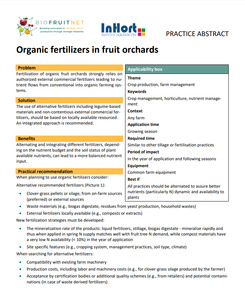{Tool} Organic fertilizers in fruit orchards (Biofruitnet Practice Abstract). Creator(s): Malusa, Eligio and Tartanus, Małgorzata. Issuing Organisation(s): IO-PIB - National Institute of Horticultural Research. Biofruitnet Practice Abstract, no. 056. (2022)
|
PDF
- Published Version
- English
(Organic fertilizers in fruit orchards)
360kB | |
![[thumbnail of 2022-07-01 14_20_29-Organic fertilizers in fruit orchards.png]](/44243/3.hassmallThumbnailVersion/2022-07-01%2014_20_29-Organic%20fertilizers%20in%20fruit%20orchards.png)  Preview |
Image (PNG)
- Cover Image
- English
126kB |
|
PDF
- Published Version
- Polish/Polski
(Nawozy organiczne w sadach owocowych)
364kB |
Document available online at: https://orgprints.org/44243
Summary in the original language of the document
Alternating and integrating different fertilizers, depending on the nutrient budget and the soil status of plant available nutrients, can lead to a more balanced nutrient input.
Practical recommendations. When planning to use organic fertilizers consider alternative recommended fertilizers:
1) Clover-grass pellets or silage, from on-farm sources (preferred) or external sources; 2) Waste materials (e.g., biogas digestate, residues from yeast production, household wastes); 3) External fertilizers locally available (e.g., composts or extracts)
New fertilization strategies must be developed: 1) The mineralization rate of the products: liquid fertilizers, stillage, biogas digestate - mineralize rapidly and thus when applied in spring N supply matches well with fruit tree N demand, while compost materials have a very low N availability (< 10%) in the year of application; 2) Site specific features (e.g., cropping system, management practices, soil type, climate).
When searching for alternative fertilizers: 1) Compatibility with existing farm machinery; 2) Production costs, including labor and machinery costs (e.g., for clover-grass silage produced by the farmer) 3) Acceptance by certification bodies or additional quality schemes (e.g., from retailers) and potential contaminations (in case of waste derived fertilizers)
| EPrint Type: | Practice tool |
|---|---|
| What problem does the tool address?: | Fertilization of organic fruit orchards strongly relies on authorized external commercial fertilizers leading to nutrient flows from conventional into organic farming systems. |
| What solution does the tool offer?: | The use of alternative fertilizers including legume-based materials and non-contentious external commercial fertilizers, should be based on locally available resourced. An integrated approach is recommended. |
| Country: | Poland |
| Type of Practice Tool: | Practice abstracts |
| Keywords: | Crop management, horticulture, nutrient management |
| Agrovoc keywords: | Language Value URI English crop management http://aims.fao.org/aos/agrovoc/c_16094 English horticulture http://aims.fao.org/aos/agrovoc/c_3671 English nutrient management http://aims.fao.org/aos/agrovoc/c_330697 |
| Subjects: | Crop husbandry > Production systems > Fruit and berries |
| Research affiliation: | European Union > Horizon 2020 > Biofruitnet Poland European Union > Organic Farm Knowledge |
| Horizon Europe or H2020 Grant Agreement Number: | 862850 |
| Related Links: | https://organic-farmknowledge.org/tool/44243, https://biofruitnet.eu, https://twitter.com/farm_knowledge/status/1611295310306844673, https://www.facebook.com/organicfarmknowledge/posts/pfbid02Ljvkea4RKD1ZXfU6bCQKs8uJbkwb8QkjuWq2Zp6FGTMd43QC8qMY2bMfG2njMLUZl |
| Project ID: | ofk |
| Deposited By: | Basler, Andreas |
| ID Code: | 44243 |
| Deposited On: | 29 Jun 2022 16:19 |
| Last Modified: | 02 May 2024 10:32 |
| Document Language: | English, Polish/Polski |
| Status: | Published |
Repository Staff Only: item control page

 Download Statistics
Download Statistics Download Statistics
Download Statistics
